Pinkwashing. Rainbow-washing. Bluewashing. Greenwashing. While they might sound bewitching, these hues represent the “many colours of ESG fraud,” or the overselling of Environmental, Social and Governance (ESG) efforts to gain favour with stakeholders.
When it comes to a company’s eco-credentials, even one false claim has the power to undermine consumer trust, threatening to tarnish all businesses with the same cynical brush. And with recent reports showing that false and misleading claims are becoming increasingly commonplace, it’s getting harder and harder to spot true eco-defenders from the pretenders.
As a movement committed to using business as a force for good, how can B Corps allay consumer fears and prove the integrity of our environmental and sustainability credo?

Image: Megan Lee via Unsplash
What’s the (green) wash?
The eco-warrior’s equivalent of cupcakes on International Women’s Day or flying rainbow flags during Pride Month and Pride Month only, ‘greenwashing’ describes the overstated, exaggerated or misleading claims of positive environmental impact without evidence.
This is not about doing good for the right reasons, and it’s not even about making mistakes, and learning from them. It’s about deliberately capitalising on the good intentions of stakeholders wanting to make greener choices, without the checks and balances to make such claims.
How on earth did we get here?
With the Intergovernmental Panel on Climate Change’s (IPCC) recent report, we are all too aware that time is running out for taking action on climate change. And, as with most things, where there is crisis, capitalism sees opportunity — and not always opportunity for greater good, but to gain greater (market) control.
This urgency, coupled with consumer’s desires not to add to the world’s woes, and marketer’s obligations to ‘cut through the noise’ and find a compelling point of difference — we have ourselves a perfect storm.

Image: Canva
According to B Corp and NZ-based news outlet Stuff, being an eco-conscious shopper has never been harder thanks to greenwashing by marketers. Browsing the shelves now means wading through a litany of lingo, including: ‘Earth smart, Natural, Green, Nontoxic, Planet-friendly.’
“If a company or its products make claims that sound good, but are essentially vague or meaningless, then let the warning bells ring. It could be greenwashing.”
— B Corp and news outlet, Stuff.co.nz
And while biologist and natural historian David Attenborough has been saying for a while that “saving our planet is now a communications challenge,” we doubt this is what he had in mind. So, how do we know we’re getting the real deal?
Sorting the wood from the (plastic) trees
One of the challenges we face in spotting an eco-defender from a pretender is that greenwashing can be done unknowingly or unwittingly, from a place of good intentions and a lack of knowing. Of course, it can also be done intentionally, from a place of greed, deception and rapacity. And as Sarah Heeringa for Stuff rightly points out, it’s becoming increasingly hard to sort the very real wood from the plastic trees.

Image: Canva
A recent YouGov poll found that over 60% of Australians are sceptical about most brands’ attempts to convince them they are green. Consumer NZ has also found that Aotearoa is awash with misleading green claims, which has similarly eroded consumer trust. The long and the short of it is: you’re not alone if you’re having trouble spotting greenwashing and the intent behind it.
One antidote to greenwashing, according to Florence Van Dyke, Head of Sustainability at New Zealand Trade and Enterprise (NZTE): recognisable and reputable certifications, like B Corp, along with independently governed standards:
“It’s a messy, confusing time and consumers need to be savvy. Words like ‘green’, ‘bio’, even ‘sustainability’ mean nothing any more, unless you have data and proof points to back them up.”
— Florence Van Dyke, head of sustainability at New Zealand Trade and Enterprise (NZTE) and Co-Founder of B Corp, Chia Sisters
As such, we are starting to see a flex in the collective power of consumers, with more and more people choosing to buy from, invest in and work for brands that represent their values. But further than that — we are seeing stakeholders, at every level, also looking to hold businesses accountable for their claims, seeking proof and calling out so-called ‘bad actors’.
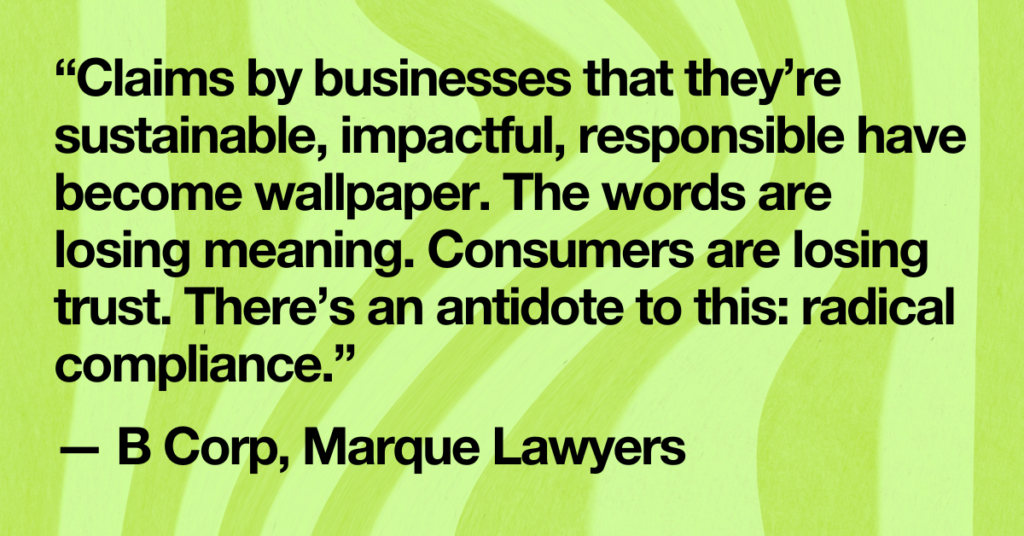
If you talk the eco-talk, be prepared to walk the eco-walk
Recently, we have seen increased attention from regulators like ASIC and the ACCC who are cracking down on greenwashing claims and demanding that businesses substantiate their claims, or risk litigation. Greenwashers have been put on notice.
Adding to the conversation is CEO of B Lab Australia and Aotearoa New Zealand, Andrew Davies, who recently shared in RagTrader:
“With greenwashing continuing to muddy the waters, one thing is clear: the days of slogans without substance are numbered. Whether in the fashion industry or otherwise, it is no longer OK to pull the wool over consumers’ eyes, if it ever was.”
— Andrew Davies, CEO, B Lab Australia and Aotearoa New Zealand
More than ever, credibility and authenticity are essential to business success in a purpose-driven economy. And this has made one thing about greenwashing black and white: radical transparency, compliance and accountability will pave the way forward.
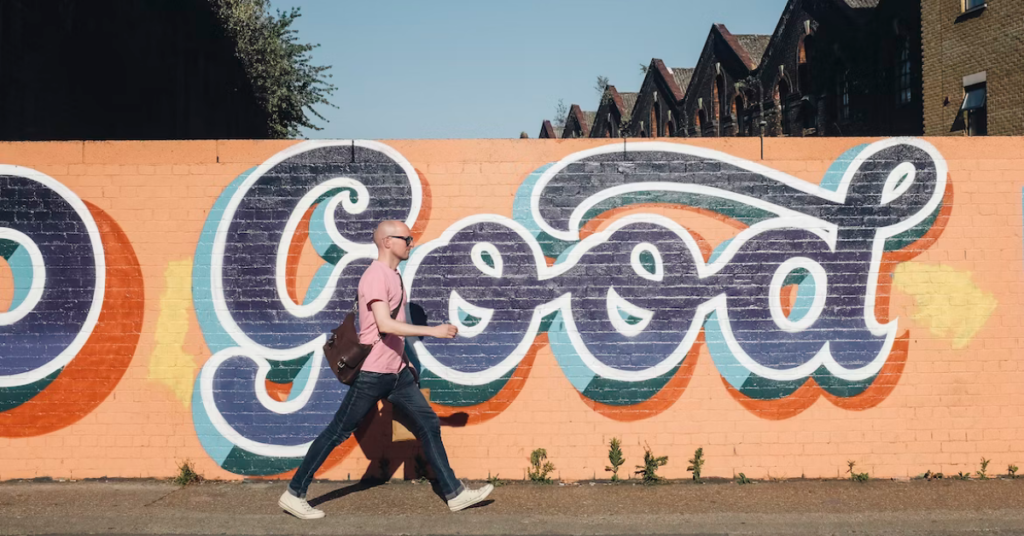
Image: Volkan Olmez via Unsplash
Put your greenwashing to the test with the B Impact Assessment
While they continue to evolve to meet the challenges of our time, tools like the B Impact Assessment (BIA) can help us independently assess, measure and manage our ESG impact, and make the pathway to improvement more clear.
Whether you use it to progress towards B Corp Certification or not, the BIA challenges businesses to look at every aspect of their operations and evidence how they consider people and the planet alongside profit:
- Have you set a climate action target?
- Are you invested in your employees? If so, how?
- What conversations are you having in the boardroom?
- Who is in the boardroom?
- Do your products come from sustainable sources?
Adding significant layers of accountability and transparency, it’s important to know that all Certified B Corporations must share their B Impact Assessment overall scores and category scores on a public profile and directory on B Lab Global’s website.
Furthermore, B Corps are required to publish an annual report that outlines their social and environmental impact and make it available to the public, sharing information about things like supply chains, carbon footprints and various aspects of financial reporting such as executive compensation.
Radical transparency is part of the deal
The B Corp is a badge imbued with meaning and purpose; one that gets earned through countless hours of deliberate, concerted action for a better world. And in order for it to stay that way, businesses must continue to meet high standards of social and environmental performance, accountability, and transparency.
While it may feel like a feat in athleticism, at times, B Corp Certification is not a race and there is no finish line. Instead, this movement is predicated on a number of principles — radical transparency chief amongst them.
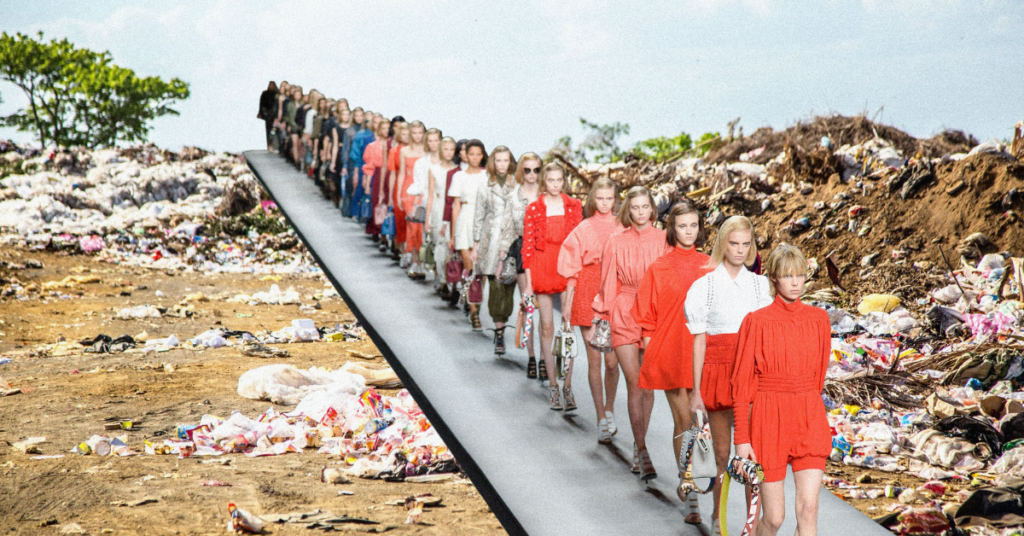
Image: Fashion Revolution
Find out how these B Corps are making the future of fashion traceable and transparent ↗
Emphasising openness, honesty, and accountability in all aspects of a company’s operations, B Corps are attempting to combat greenwashing (and the climate crisis) with a potent combination of transparency, accountability and compliance.
Businesses also have to recertify every three years, or after a Change of Control or Initial Public Offering, to maintain their status. And part of the reason for that is because ‘impact’ is neither a destination to be reached nor a box to be ticked.
Instead, we like to see B Corp Certification as the next step of an ongoing journey to improving impact and transforming the global economy, with transparency at its core.
By making the sometimes overwhelming world of ESG more accessible and practical, both the BIA and B Corp Certification are trying to help businesses of all sizes create a more trust-driven, accountable and responsible economy, which is a far cry from the type of business as usual we’ve come to expect.
But what happens when things don’t go as planned?
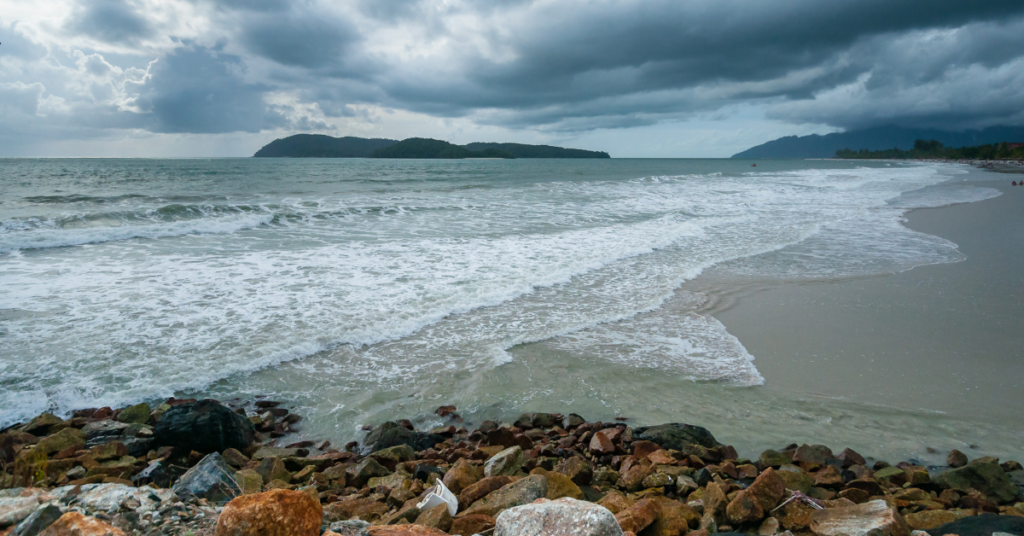
Image: Canva
The rising tide of ‘green-hushing’
Despite what slogans may suggest, no brand has it 100 per cent right all of the time, not even Patagonia. At this point, it would be remiss not to acknowledge that there are certainly B Corps amongst those who have called out, or called in, for exaggerating eco-claims or for not performing as well as might be expected in the ‘Environment’ impact area of the B Impact Assessment.
This is undoubtedly one of the guiding motivators behind the movement’s new draft standards, ensuring that certification remains relevant for the challenges of today and tomorrow. Though, even as ‘greenwashers’ are rightly being called out, this sometimes retributive approach can breed a fear of getting it ‘wrong’ that gets in the way of taking any action at all. And this has created a slowing rising tide of ‘greenhushing’.
“Unfortunately, many who are doing good work are also reluctant to speak out about it, holding back and saying less, out of fear of being labelled as ‘greenwashers’. The rise of so-called ‘greenhushing’ might be understandable, in this context, but it’s certainly not helpful.”
— Andrew Davies, CEO, B Lab Australia and Aotearoa New Zealand
The simple truth is that transparency is not just about sharing the good stuff. Instead, we need all businesses to find ways to be transparent about their progress if we’re to have any hope of addressing global challenges on the scale of climate change.
We need purpose-led businesses prepared to own and acknowledge what they’re not so good at, and plot a pathway to better.
And especially in these uncertain times, we need more businesses prepared to tell the full story and find verifiable ways to better manage and measure their environmental impact.
We need businesses who are prepared to own — and be transparent about — what they’re not so good at, regardless of the fact that these are often the best stories to tell. Because by naming the wicked challenges you are committed to solving, you invite others to join the cause. Going well beyond slogans without substance, and the perils of greenwashing — this is the power of purpose.
“We need leaders to lead. Sometimes this means you make mistakes. In fact, I am learning that leadership is about strategically and intentionally disappointing people at a rate that they can sustain. It might sound harsh, but there is a freedom and a power in owning that leadership comes with uncomfortable choices.”
— Andrew Davies, CEO, B Lab Australia and Aotearoa New Zealand
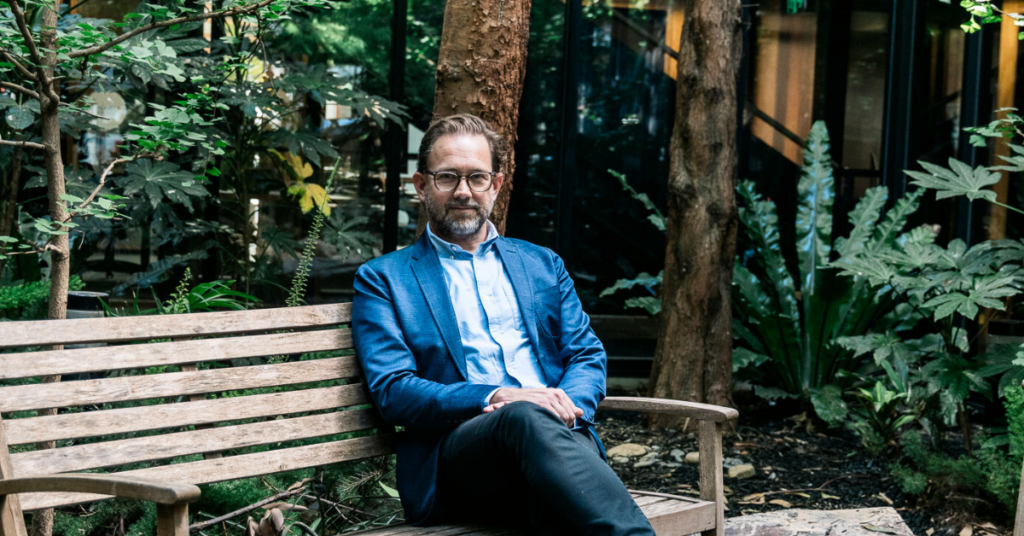
Image: Andrew Davies, CEO, B Lab Australia & Aotearoa New Zealand
Get ready to take imperfect action
Having brands and people talking about the actions they are taking, and what we’re struggling with, is just as important to shift the dial for the climate. If we are all quietly doing the work, it will make a dent, but it will never reach the pace of change, or influence required to turn the heat down.
Perhaps this is more what Attenborough et al. had in mind: businesses and marketers courageous enough to share the good, the bad and the ugly, so we can start to rebuild an economy with trust, authenticity, integrity, and transparency at its core.
Keen to continue the conversation? Listen to this recent episode of B Lab’s Forces For Good podcast on greenwashing and this episode of the Fresh Meet podcast with B Corp Manifest, watch the recording of our Radical Compliance in Advertising webinar and be sure to download a copy of our Advertising Claims Manual.

